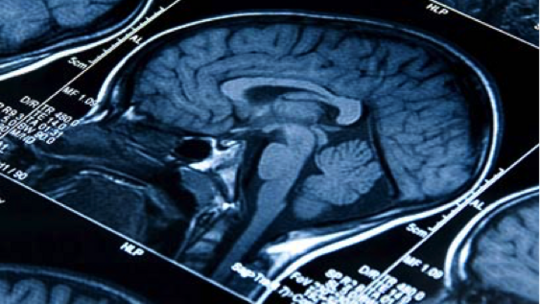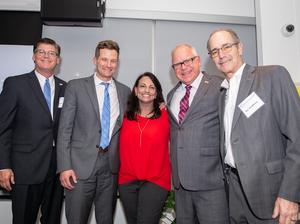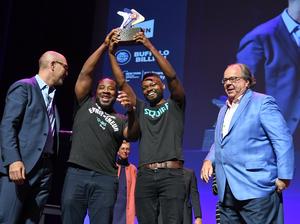
Medical College of Wisconsin Researchers Take Team Approach to Combatting Sports-Related Head Injuries
By Dr. Michael McCrea, PhD, Professor of Neurosurgery and Neurology and Director of Brain Injury Research at the Medical College of Wisconsin
MRI imaging may reveal changes to the brain following concussion injury.
There’s little doubt that the issue of sports-related concussion (SRC) has gone from relative obscurity 15 or 20 years ago to it now being a mainstream, household topic across America and around the world, particularly as parents evaluate potential risks to kids participating in certain sports.
At the Medical College of Wisconsin (MCW) we have been at the forefront of research related to concussion and traumatic brain injury.
Recently, MCW was named co-leader of a study on potential long-term neurologic health consequences of concussions and repetitive head impact exposure sustained by former NFL players. The study will track up to 2,500 former NFL players previously surveyed in 2001 with annual follow-up assessments.
Additionally, we’re currently leading advanced research efforts that are part of the NCAA-Department of Defense Concussion Assessment, Research and Education (CARE) Consortium. The effort includes research being done at 30 colleges and universities nationwide and since 2014 has collected data from more than 40,000 collegiate athletes, including more than 3,000 who have suffered concussions.
In October, the CARE Consortium received nearly $22.5 million in additional funding from the U.S. Department of Defense and the NCAA to continue research involving collegiate athletes. Specifically, the new phase will include comprehensive testing of the study participants when they leave college and up to four years after their collegiate sports or service academy career has ended. This expanded approach will enable researchers to study the intermediate and cumulative effects of concussion and repetitive head impact exposure.
Research and the resulting innovation in treatment is allowing caregivers, athletes and their families greater understanding of an important health condition.
Advancing concussion science
Enormous strides have been made in understanding the science of concussion. Twenty years ago, state-of-the-art concussion assessment was asking the athlete questions like “Where are we?” or “How many fingers am I holding up?” It was commonplace for athletes to return to the field or court of play within minutes.
Over the years, however, applied studies have provided a better understanding of concussions and the natural course of recovery. Findings of such research have led to informed international consensus guidelines on appropriate concussion protocol when treating an impacted athlete.
Such protocol calls for an athlete to be closely monitored over a period of days while appropriate rehabilitation takes place and the brain is allowed to rest.
Some particularly exciting research taking place now at MCW pertains to more accurately determining when a brain impacted by concussion is healthy and the athlete is ready to perform again.
Specifically, MCW research is taking a closer look at imaging and blood biomarkers that present themselves when a brain suffers a concussion or more severe traumatic brain injury. These biomarkers can increase within hours of an injury and help caregivers determine the severity of a concussion along with when an individual is ready to return to normal activity.
Understanding such biomarkers can help caregivers get a better grasp on how concussions impact different individuals. Concussions are like snowflakes — no two are alike, which means individuals react and heal differently to experiencing a concussion.
At MCW, we’ve been conducting innovative research to understand concussions and traumatic brain injury for the past 25 years. This work, along with research taking place around the world has created a much better understanding of how to treat concussions.




